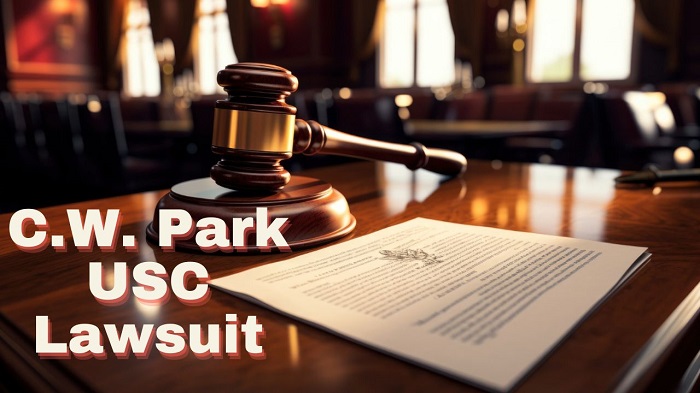Introduction to the C.W. Park USC Lawsuit
Step into the interesting world of academia where a fight in court is unfurling, focusing on the C.W. Park USC Lawsuit. This high-profile case has captured consideration for its complexities and implications within the academic domain. Go along with us as we dig profound into the subtleties of this lawsuit, investigating the vital participants, charges, legitimate premise, and expected impacts on the academic community. Prepare to disentangle the fascinating adventure encompassing C. W. Park and USC in this must-peruse blog entry!
Background on the Parties Involved
In the unfurling C.W. Park USC Lawsuit, understanding the background of the gatherings included is crucial to get a handle on the complexity of this fight in court. On one side stands Dr. C.W. Park, a renowned teacher at USC known for his contributions to academia in the area of psychology and research strategies.
Contradicting him is the College of Southern California (USC), an esteemed organization with a standing for academic excellence and development. The connection between Dr. Park and USC goes back years, set apart by collaborations, publications, and shared successes in research tries.
However, recent claims have stressed this once amicable organization, prompting a contentious lawful question that has captured consideration within academic circles and then some. As the two sides get ready for what vows to be a protracted fight in court, a lot is on the line for all engaged with this intricate web of academia meets prosecution
Read More: The Importance of Hiring an openhouseperth.net Lawyer
The Allegations Against C.W. Park and USC
The claims against C.W. Park and USC have sent shockwaves through the academic world, bringing up issues about trustworthiness and ethics in research. At the center of the controversy are accusations of information control and falsification in distributed examinations, discoloring the standing of both the renowned teacher and lofty college.
Accusations like these strike at the core of scholarly pursuits, where trust and credibility structure the underpinning of academia. The aftermath from such claims can be broad, sabotaging individual careers as well as disintegrating public confidence in educational establishments as a whole.
As examinations unfurl and subtleties arise, onlookers are left wondering how such misconduct could have gone undetected for such a long time. The case fills in as a distinct update that vigilance is fundamental in maintaining academic norms and guaranteeing transparency in research practices.
The implications of these claims resonate past only one lawsuit; they act as a wake-up call to academia to focus on ethical conduct regardless of anything else.
Legal Basis for the Lawsuit
In the C.W. Park USC Lawsuit, the legitimate reason for the lawsuit originates from claims of misconduct and ethical infringement within the academic domain. The offended parties have raised concerns with respect to copyright infringement, falsification of information, and different breaches of academic honesty supposedly committed by Dr. C.
W. Park and the College of Southern California.
The crux of the lawsuit spins around whether these actions disregarded laid out codes of conduct within academia and on the off chance that they have prompted reputational hurt or financial harms to those included. Legitimate specialists are looking at contracts, research arrangements, and institutional policies to decide risk and accountability in this complex case.
The outcome of this fight in court will rely on how effectively each party can introduce evidence supporting their claims while exploring through intricate lawful doctrines such as intellectual property privileges, academic opportunity, and expert ethics. As the case unfurls in courtrooms and academic circles the same, it brings up significant issues about accountability and obligation in advanced education settings.
Impact on the Academic World
The C.W. Park USC Lawsuit has sent swells through the academic world, sparking discussions on respectability and accountability in research. The claims against Park and USC have raised concerns about academic misconduct and its implications for scholarly work.
Establishments are reexamining their policies to forestall comparative incidents and keep up with trust within the academic community. Researchers are helped to remember the importance of maintaining ethical norms to safeguard the credibility of their work.
Understudies are witnessing firsthand how fights in court can impact educational establishments, forming their perspectives on academic ethics and amazing skill. The case fills in as a cautionary story for yearning scholars, featuring the consequences of unethical conduct in academia.
The lawsuit’s repercussions stretch out past people included, provoking a more extensive reflection on ethics in research and education.
Responses and Reactions to the Lawsuit
The C.W. Park USC Lawsuit has sparked a scope of reactions and reactions within the academic community and then some. Numerous people have communicated shock and disillusionment at the claims evened out against both C.W. Park and USC, two substances that were recently respected.
Some have called for transparency and accountability, asking exhaustive examinations to uncover reality behind the claims. Others possibly affect understudies, faculty, and by and large academic uprightness at USC.
On social media stages, discussions have been exuberant with assorted suppositions being shared. An are calling for swift action to address any wrongdoing, while others caution against hurrying to judgment before all facts are introduced.
As news of the lawsuit continues to unfurl, obviously this case has raised significant premium and concern among those put resources into academia and ethical practices within educational foundations.
Possible Outcomes and Future Implications
As the C.W. Park USC lawsuit unfurls, many are speculating on the potential outcomes and future implications of this fight in court in the academic world. One potential outcome could be a settlement between the gatherings in question, which could include financial compensation or different arrangements. Another chance is that the case goes to preliminary, focusing on issues of academic respectability and research misconduct.
The repercussions of this lawsuit could stretch out past C.W. Park and USC, affecting how colleges handle charges of literary theft and ethical breaches among faculty individuals. It might likewise incite establishments to rethink their policies in regards to research practices and academic conduct.
More:
Moreover, contingent upon how this case is settled, it could start a trend for comparable circumstances in the future within academia. The impact of such a high-profile lawsuit resounds within these specific establishments as well as across the more extensive academic community too.
Conclusion: Lessons Learned from the C.W. Park USC Lawsuit
The C.W. Park USC Lawsuit has carried significant consideration regarding the academic world, revealing insight into issues of research misconduct and institutional accountability. As we reflect on this fight in court, a few examples arise that can direct us in guaranteeing respectability and transparency in academia.
Establishments should focus on cultivating a culture of compliance and accountability. Colleges ought to execute strong oversight mechanisms to immediately detect and address any possible breaches of research trustworthiness.
Open communication and swift action are key in tending to charges of misconduct. Straightforward examinations ought to be conducted speedily to determine questions effectively while maintaining reasonableness for all gatherings included.
In essence, the C.W. Park USC Lawsuit fills in as an update that ethical conduct is non-debatable in academia.


